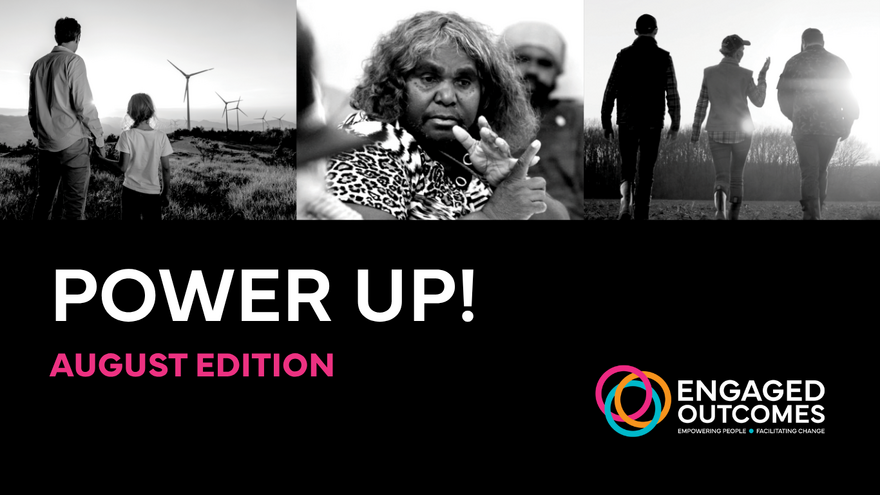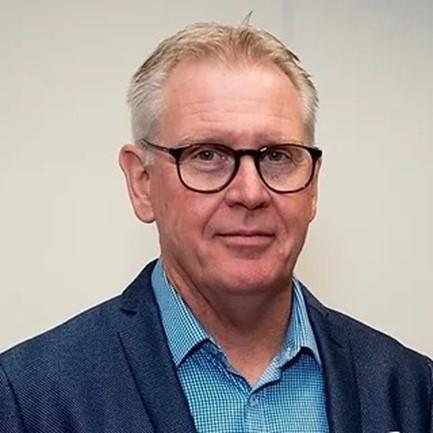
Note from Wendy
Hello there!
Last month we explored trust—how it's built, lost, and earned again—and this month we’re continuing that thread by turning our focus to the power of regional collaboration.
In the context of the energy shift, regional collaboration is a topic we hear discussed often, but what does it really look like on the ground?
In our latest Power Hour, Rethinking Renewables & Regional Collaborations, we explored exactly that. The Wimmera Regional Energy Collaboration is a standout example of what’s possible when the energy sector, government, and local leaders come together with a shared commitment to working differently.
We took so many notes! As our key note speaker, Chris Sounness (CEO, Wimmera Southern Mallee Development) said:
“It’s about bringing the energy sector, government and local leaders together to work differently on the energy transition. It’s a working partnership... We’re already changing how people show up and act together. It doesn’t need new infrastructure—it needs new behaviours if we want to leave a legacy.”
We also loved these quotes from the panellists:
“Industry also needs help collaborating. Without that sort of partnership, we won’t deliver the benefits we all want to see for regional communities.” — Sabiene Heindl, CEO, The Energy Charter
“All of industry is judged by the lowest common denominator. That’s why this regional collaboration has been so useful - to actually lifts that.” — Colin Kemp, Engagement Lead, WestWind Energy
As Chris always says… the work they are doing in the Wimmera is a process. It isn’t finished and it isn’t easy! If you missed the Power Hour you can find the recording here, and you can learn more about what they are doing and what they have learnt here – Regional Energy Collaboration Framework - The Energy Charter and it is also worth listening to Chris’s episode on the emPOWER podcast.
You might also be interested in listening to 2 other fabulous collaboration examples on emPOWER –
Hay, NSW - “Discussion not Division” podcast with Ali McLean & Kate Hook - where they share the process the undertook in the collaboration between local council, community and proponents to create a shared vision for the region.
Miles, QLD – “Beyond netball skirts & BBQ’s” podcast with Kylie Bourne – shares the story of how a small community came together to develop a strategy to ensure lasting legacy from the CSG benefit funding.
One of the strongest threads running through all these examples? Leadership. Not just the formal, top-down kind—but the grounded, courageous, community-driven kind that comes from grassroots. It’s the locals who know their communities, who lean into the complexity, and who bring others along with them, that really make things happen.
These leaders aren’t always in formal roles or found on a website. Often, it takes a ‘burning bridge’ moment to activate them, they’re the people who step up, rally others around a shared purpose, and get moving. While having the right people in the room, a strategic process, and trusted facilitation is essential, none of it works without that foundation of local leadership. While we often hear about the successes, what’s less visible is the persistence, the setbacks, the personal price that is paid and the courage it took to stay the course and make progress. I take my hat off to the amazing work these leaders are doing ...
Supporting emerging regional leaders is work I’m passionate about. Through our work at Engaged Outcomes, and in working with Environmental Leadership Australia and Australian Rural Leadership Foundation, I’m proud to play a part in building capacity needed to lead place based change.

Regards,
Wendy
Regional Leader spotlight
John CareyThis month we are shining a light on John Carey – Stakeholder Engagement Manager (Southern Region) at Stanwell, Deputy Chair of Red Earth Community Foundation, and Board Member of Regional Development Australia Wide Bay Burnett. "Kingaroy has been home for the past 20 years. I grew up in a small community near Warwick called Yangan, and moved to the South Burnett in 1999. We discovered this fantastic region after some close friends retired near Yarraman, and over a couple of years, we made the transition - finding work, purpose, and a place that aligned with our values and aspirations. It quickly became home for our family, and today it’s where our grandchildren are growing up.
"The wider South Burnett region reminds me a lot of the community that shaped my first 18 years. It wasn’t until we relocated here from Brisbane (where we had spent 13 years) that I realised just how deeply the rural and regional perspective still influenced my outlook, values, and sense of connection.
John’s career spans more than four decades across banking and finance, public service, local government, community development, and, since 2008, stakeholder engagement in the energy and resources sector. His approach to leadership is grounded in the belief that community is where humanity thrives—and that we each have a duty to leave something better for those who come after us. A values-led leader, John describes his purpose as a “heart call” to help communities build better futures. He sees leadership as collective, inclusive, and intergenerational—built not just on what we achieve, but on the lives we touch along the way. Have a listen to John’s episode on the emPOWER podcast, here. |
|
|
From the Field
|
This month's guest contributor is the amazing Renee King, the Future Program Manager at Western Downs Regional Council, sharing her take on what it takes to collaborate in regional communities. We would be remiss not to mention that regional collaboration at its heart, is really about the essence of rural Australian life: mateship, resilience, and a oneness with that rugged open landscape. Regional Australia is where collaboration is not just a nice to-do in theory but is essential to everyday life. Collaboration is something regional Australian communities do extremely well. The conversations I am hearing in the energy transition all centre around the challenge of developer-collaborating-with-region. I wanted to turn this on its head and reframe the conversation to the essence of regional Australian values. Let's have a strengths-based view of regions, because regional communities already have strong foundations that value collaboration much more deeply than we can tell from the outside looking in. I have worked with diverse communities in regional Australia for eight years, as a community development practitioner, and I can't emphasise enough that regional communities are at the forefront of regional collaboration. Here are three anecdotes that highlight the built-in conditions for regional collaboration that regional communities have; and how we can all do better to enhance and nurture their unique collaborative qualities. Understand Power All communities have power dynamics that play out in everyday life. Communities that collaborate well understand the power dynamics, who the power brokers are, and who doesn't have the power to raise their voice. Those power brokers in authority cede power and empower others to voice their perspectives, either by giving them a seat at the table to make decisions or by finding ways to ensure their voices and aspirations are heard. When regional communities understand power, they can focus on equity and inclusion and find ways to ensure fairness in all decision making. The development of a renewable energy project often reshapes the local power dynamics - council, landowners, and local residents stand to gain or lose influence and this can destabilise regional communities. Mapping local stakeholders to identify where power sits, being transparent and respecting existing power dynamics, and empowering underrepresented voices in decisions is important to retain and enhance regional collaboration. Build a Common Agenda Communities that collaborate well are grounded in clear agreements on what matters most. I have seen small regional towns rally behind a local childcare centre when it was days away from closing, because all members of that community agreed - that the availability of childcare mattered most. Regional communities that align to specific, measurable, and equitable goals are so good at collaborating. They present a unified and cohesive voice to funders, government, and beyond to advocate and build momentum around local priorities. Communities are more likely to support large-scale projects that also align to their common agenda - whether it’s the childcare centre, job creation, better roads, or community investment. Developers of renewable energy projects would do well to support the development of place-based plans and co-create goals with communities to enhance collaboration that builds-in accountability and trust. Know their Networks Beneath power and common goals, regional communities who collaborate well can map the network of services and stakeholders who make that place tick - the dog groomer, the cat sitter, the house cleaner. And they can probably provide full names and home addresses of the local police officers!! Connections and networks are more valuable in regional communities and hold more information than a google search. Successful regional collaboration rests on appreciating the networks that exist in that town. Some regional communities who know their networks even create governance frameworks and processes to streamline and collaborate even better - for example, when local sports clubs amalgamate to reduce volunteer burnout and so they can integrate seasonal fixtures so that everyone has access to social sport all year round. These networks are essential to social cohesion and collaboration. When arriving in a regional community, often the first challenge is finding the right people to talk to. Regional networks are goldmines of informal influence. For us outsiders coming into regional communities, a key challenge is finding the local connectors to build trust and spread information, but most importantly we must respect their networks and the reactions or potential fallout that could come their way. The truth is some communities don't have the conditions of collaboration built-in; and it shows through distrust of outsiders; distrust of one another; communication break downs; and opposition to change of any kind. Where the social fabric sadly is woven so loosely that only time and leadership can change. But, when the conditions for collaboration are right, regional communities are special. They look to their authorised leaders and empower one another; they have the capacity to build and plan for common goals; and they lean on local networks to organise for a future that they can continue to thrive. Do not underestimate the strength of regions and their propensity for deep collaboration. You can learn more about Western Downs Futures work here. |
|
|
EmPOWER Podcast
Our emPOWER podcast series provides practical skills and insights to inspire action, better understanding of stakeholders and improved outcomes for people engaging across regional Australia.
We LOVE our two episodes that we released last month. If you missed them, you can learn more below!
We are currently taking a short break as we prepare for Season Three to kick off in September - in the meantime, catch up on all your favourite past episodes here.
|
|
|
🎙️Episode 21: From Coal to Clean - Latrobe Valley's Energy Shift This episode features Tony Wolfe, lifelong Latrobe Valley local and former coal industry worker, in conversation with Wendy Agar about what a just and community-led energy transition looks like for coal regions. Drawing on Tony’s lived experience in the coal sector, local government, and renewable energy advisory groups, they explore the deep cultural and economic shifts underway in Gippsland. The conversation highlights the importance of recognising community identity, addressing overlooked solutions like energy efficiency, and ensuring workers and families aren’t left behind. |
|
|
🎙️Episode 22: Joanna Stevens - Meaningful Engagement in Regional Australia In this episode, Wendy Agar sits down with Joanna Stevens, founder of Premier Strategy, to discuss how to build trust and deliver meaningful engagement in regional communities. Drawing on Jo’s extensive background in journalism, government, and corporate communications, they explore what it really takes to work with—not just in—regional Australia. From grounding yourself in community context to setting up engagement strategies that stick, the discussion offers practical guidance for anyone operating at the intersection of policy, infrastructure, and local impact. |
Catch up on our latest episodes here.
PowerHour Virtual Forum
|
|
|
In our July PowerHour episode, attendees joined an insightful and engaging forum featuring leading voices in regional collaboration, where we explored what it truly takes to drive change through trusted relationships and shared vision. From expert practitioners to regional leaders on the ground, the session brought together diverse perspectives to highlight how local leadership, lived experience, and evidence-based insight can power meaningful progress. The virtual forum opened with keynote speaker Chris Sounness (CEO, Wimmera Southern Mallee Development), who spoke passionately about the journey and impact of the Wimmera Southern Mallee Regional Energy Collaboration. Sabiene Heindl (CEO, The Energy Charter) followed, sharing national-level insights into the challenges and opportunities of collaborative energy reform, while Colin Kemp (Westwind Energy) brought a project developer’s lens to the conversation, discussing practical strategies for fostering trust, navigating complexity, and ensuring communities are heard and included. One clear takeaway stood out: meaningful regional change doesn’t happen without collaboration built on trust, shared knowledge, and lived experience. and supported by a clear framework. You can watch the recording and catch up on past episodes here. Chris also shares his insights on fostering collaboration to bring people in the region together inthis episode of the emPOWER podcast. Register now for our next PowerHour Episode on 21 August: "Rethinking Renewables + Development Challenges" Thank you to our proud partners of the PowerHour 2025 series - Powerlink and Windlab. |
Fuel for Thought: Check out this Valuable Resource
Striking a New Deal for Renewables in Regions
This report shares insights from leaders in regions with significant renewable energy investments around Australia, and is part of a collaboration by The Next Economy, RE-Alliance, Foundation for Rural & Regional Renewal and ProjectsJSA - read it, here.






